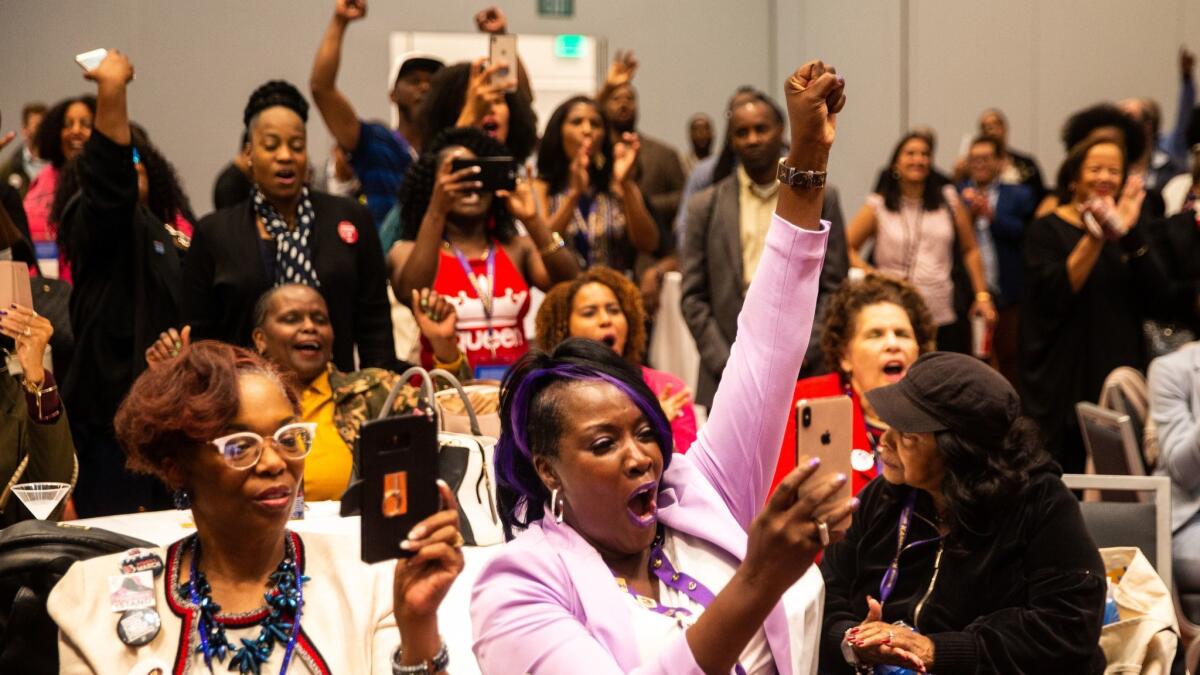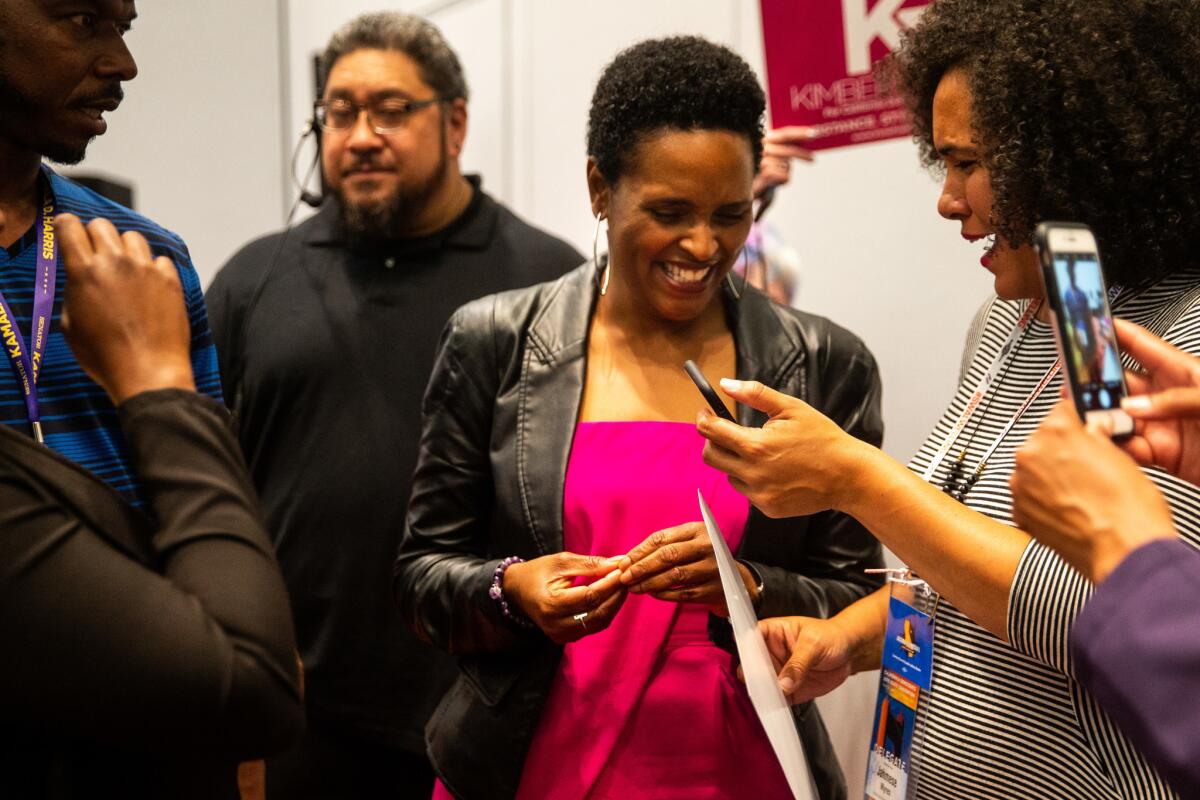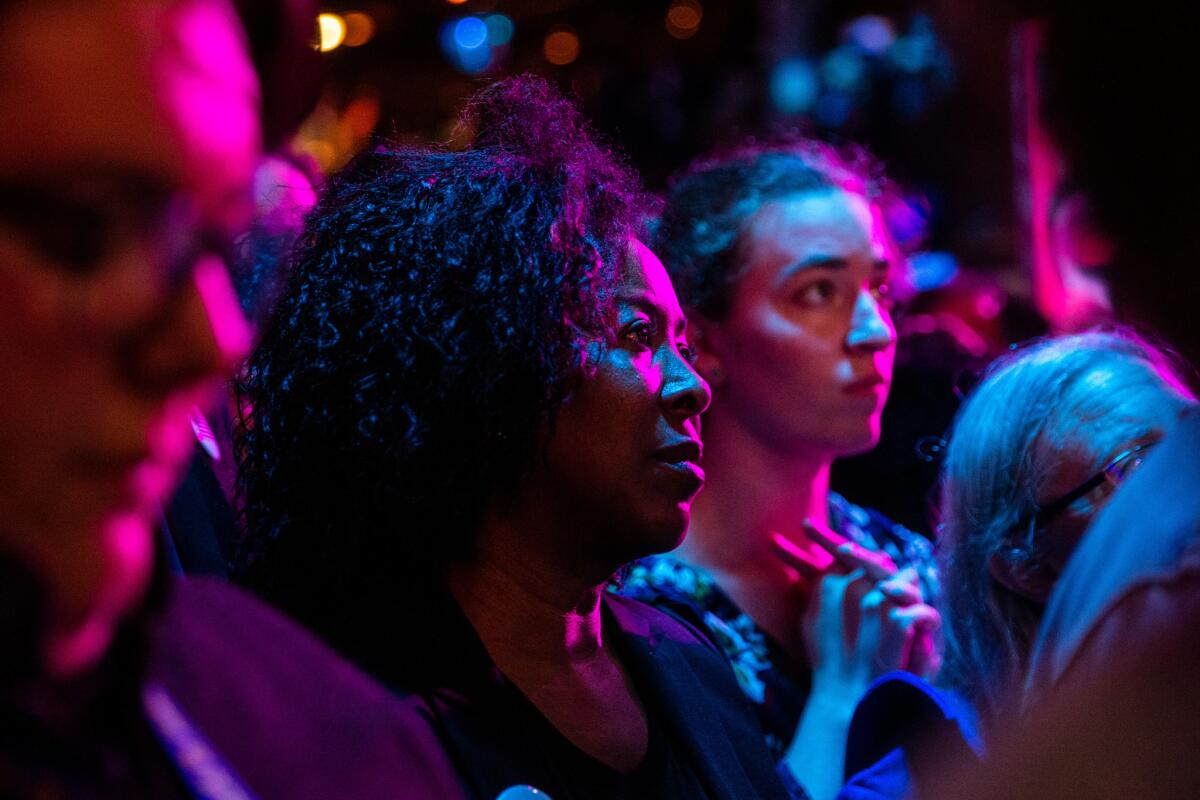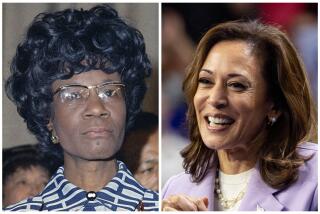Feeling marginalized by the California Democratic Party, black women push for more clout

State Sen. Holly Mitchell of Los Angeles looked out at more than a hundred black women gathered for an annual event at the California Democratic Party convention earlier this summer and marveled at the group’s progress.
“The first Black Women’s Meetup we could have had in a 7-Eleven ladies’ room; there were that few of us,” Mitchell said, surveying the crowd. “Look at you now.”
They had much to celebrate. California Sen. Kamala Harris had launched a front-running bid for president. Democratic victories in the 2018 midterm elections helped refocus attention on black women as a pivotal Democratic voting bloc. The number of black women delegates to the California Democratic Party had more than tripled in just two years. And Mitchell and others were seeking to elect the party’s first black female chair, Bay Area activist Kimberly Ellis.
Ellis would go on to lose the race — a reminder to many black women in the Democratic Party that they still have a long way to go. But her candidacy is fueling a renewed push by black women in California to demand more clout in the organization, which they say has failed to make enough room for them at the top.
“We are an endangered species in the eyes of some, so that means that we need to do what?” Mitchell said at the meetup, placing her hand behind her ear. “We need to roll up like black women have done for generations and we know how to do.”
The conversation comes after the November elections delivered the most racially diverse Congress in history and as Democrats nationwide look to improve representation and outreach in their party among Latinos, Asian Americans and young people.
But few of those groups have been as loyal to the Democratic Party as black women.
Long a crucial part of winning Democratic coalitions, black women vote often — in 2008 and 2012, the turnout rate for eligible black women voters was about 7 in 10, higher than any other race or gender subgroup — and reliably Democratic. Exit poll data show some 96% of black women who voted in 2008 and 2012 cast ballots for President Obama, while a majority of white women voted for his Republican opponents.
Some attribute Hillary Clinton’s loss in 2016 — when turnout among black women fell several percentage points — to her campaign’s failure to mobilize black voters. Exit polls show some 94% of black women voted for Clinton.
Black women were also the party’s most faithful voters in the 2018 midterm elections, with 92% of those who voted supporting Democratic candidates, according to exit polling.
While black voters make up a relatively small percentage of California’s electorate — about 6% of likely voters — the state’s size means the number of black voters here rivals that in New York or Georgia.
Democratic leaders say that to win, the party must focus more on turnout among women of color and elect officials who will execute such a plan.
“People are tired of feeling marginalized,” Assemblywoman Sydney Kamlager-Dove (D-Los Angeles) said. “It’s one thing to continue to ask someone to knock on doors or to write a check, but not to be considered viable as a candidate…and to not say, ‘Hey, why don’t you run to be a delegate?’”
Following the 2016 election, Kamlager-Dove and other California leaders were shocked to learn that national Democrats didn’t have cohesive plans to support black women running for office, prompting activists to organize.
“I think as you see more black women deciding to run for office, then you see other black women saying we can’t just have this sister out here on her own. We have to have people helping her win,” she said. “I think just having someone like Kamala Harris run to be president of the United States says that if we want this woman to get there or even have a shot, then we have to be organized as black women.”
Kamlager-Dove was one of dozens who signed an open letter to the Democratic National Committee in 2017, criticizing the lack of black women in top party positions in Washington and state organizations, and the “scant support” for black women candidates. Quoting activist Fannie Lou Hamer’s 1964 speech demanding a more prominent role for African American Democrats, the letter said, “We are ‘sick and tired of being sick and tired.’”

That message was echoed in Ellis’ bid to lead the California Democratic Party.
Her campaign T-shirts bore an image of a folding chair, representing the words of late New York Rep. Shirley Chisholm — the first black woman to seek a major party’s nomination for president — advising women to bring one “if they don’t give you a seat at the table.” Before the election for party chair, hundreds — mostly women — rallied outside the convention hall to cheer Ellis on, some carrying large cutout images of notable black women in history: Sojourner Truth, Angela Davis and black transgender activist Marsha P. Johnson.
“Black women are not just the margin of victory,” Ellis yelled into a pink bullhorn as supporters raised their fists. “But you cannot win without us!”
Her eventual loss to Los Angeles labor leader Rusty Hicks came as a surprise to supporters of both candidates, who witnessed the large and vocal crowds behind Ellis. Hicks, who was backed by several major unions and a long list of elected officials, was seen by some as an even-keeled pick who would prevent the party from moving too far left.
After the race, Hicks said he would install a new committee, co-chaired by Ellis and two others, that will make suggestions on how to improve representation in party leadership. More than half of the 24-person committee comprises women and more than two-thirds are people of color. Its lead chair, Ada Briceño, is only the second Latina to helm the Orange County Democratic Party.
“It is undeniable that African American women are a core part of the success of the Democratic Party and progressive politics both in California and in this country,” Hicks said. “I think that we have an opportunity in California to be an example of how we ensure that all voices are at the table, in particular those voices that play such an important role in our collective success.”
Ellis said she’s heard from dozens of people, many of them black women, who have told her they’re reconsidering their commitment to the state party after her loss, making work to improve representation in party leadership all the more urgent.
“I think black women are recognizing our power and are choosing to take a closer look at where we are going to put our loyalties and our votes,” Ellis said. “We as a community don’t need the Democratic Party. The Democratic Party needs us and we need to remember that.”
Deana Becker, a delegate from Marina del Rey, says she has been discouraged by the lack of black women in high-profile positions.
“Everybody wants us to be the pillars holding everyone up, but nobody wants us to be on the pedestal,” she said.
Aimee Allison, founder of advocacy group She The People, says Ellis’ defeat represents a missed opportunity not only to elect a woman of color to helm a major state party, but to adopt a more aggressively liberal agenda.
“I think the Democratic Party playbook has for a long time kowtowed to the fears of the white moderate,” Allison said. With California positioning itself as a leader in the so-called resistance against the Trump administration, Allison added, “This isn’t the time for all that.”
Nevertheless, some say Ellis’ campaign galvanized black women in the party in a way not seen in years.
Dezie Woods-Jones, a former Oakland City Council member who founded Bay Area advocacy group Black Women Organized for Political Action in 1968, said Ellis inspired scores of new activists to join the party or become more engaged.
“Once in a while, while we’re out here in the struggle, we see an emergence, a spark that triggers people and energy that we haven’t seen for a while,” she said.
Former legislative staffer Kellie Todd runs a quarterly call for elected officials, nonprofit executives and others to discuss how best to promote black women candidates and causes. The week after Ellis’ loss, Todd said, they discussed what to do next to encourage black women to run for office.
“The door that [Ellis] opened is for black women to feel empowered in the party process like they never had before,” Todd said. “The goal is to keep that momentum going.”
One strategy black women should consider is running against Democratic incumbents in primary elections, Allison said, adding that women of color have previously been “least supported, most challenged and most undercut” in those contests.
Others are recruiting their peers to run for party positions.

At the Black Women’s Meetup in June, Los Angeles activist Dallas Fowler pulled aside two women who were attending their first political convention.
“We have to get women in leadership positions and the only way we do it is to be present,” Fowler told them.
Carmen Brammer, a 57-year-old tech worker from San Jose, never thought about getting involved in her party until she heard about Ellis’ run for chair.
“I just said I have to really get to understand this party because I want to make sure it represents me,” she said.
But Fowler, who has been a delegate for more than a decade, is now considering taking a step back, focusing instead on running for Los Angeles City Council.
“I’m still a proud Democrat. That doesn’t mean that my values have changed,” Fowler said, noting that while she’ll still encourage others to participate, she’s frustrated that she hasn’t helped lead major committees or caucuses. “I’ve got one foot in and one foot out. And I’m watching.”
Assemblywoman Shirley Weber (D-San Diego) said she understands.
“I feel that way sometimes,” Weber said. “But there’s a gospel song, ‘Where Could I Go But To The Lord?’ The same is true here. Where you gonna go? You’re not going to join the Republican Party. You’re not a Trump supporter.”
Weber said that over the years several black women have told her they’re through with the party — that they’re done spending so much time, money and effort for so little recognition.
But, she said, a few weeks later she’ll see them back at a county meeting or receive a phone call to strategize.
“They are not the type that says, ‘I don’t care what happens in the world, I’m just going to go home,’” Weber said. “These are not sit-down people.”
More to Read
Sign up for Essential California
The most important California stories and recommendations in your inbox every morning.
You may occasionally receive promotional content from the Los Angeles Times.











